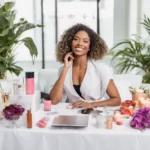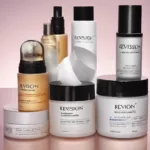22 November 2023
Industry leaders gather to discuss the changing retail, influencer, and marketing landscapes at the annual Glossy Beauty x Wellness Summit.
Last week, the Glossy Beauty x Wellness Summit brought together hundreds of brands, retailers, and investors in Santa Barbara, California. The three-day event was a platform for industry leaders to engage in discussions about the evolving retail, influencer, and marketing landscapes. Among the key themes that dominated the conversations were brand differentiation and the importance of fostering organic communities. This article delves into the insights shared at the summit, highlighting the strategies and approaches that brands are employing to stay relevant in a crowded market.
Brand Points of View and Founder Stories Drive Differentiation
In a market saturated with beauty and wellness brands, standing out from the competition is crucial. The summit emphasized the significance of brand narratives and founder stories in establishing a unique identity. Brands that can effectively communicate their purpose and offer a science-backed story have a better chance of securing partnerships and reaching consumers.
Ron Robinson, founder and CEO of BeautyStat Cosmetics, highlighted the importance of showcasing product efficacy through testimonials, before-and-after user photos, and independent clinical validation. BeautyStat Cosmetics, known for its vitamin C serum called the Universal C Skin Refiner, has successfully partnered with Ulta Beauty, leveraging its science-backed approach. Similarly, K18, a bond-building hair care brand, differentiated itself with a patented K18Peptide system that reverses hair damage on a molecular level. K18’s unique approach allowed it to secure a place at Sephora, despite the presence of other bond-building hair care brands.
However, differentiation is not limited to science-focused brands. Ceremonia, a hair wellness brand, celebrates Latinx heritage through its ingredients, products, and focus on hair wellness. By tapping into the better-for-you category, Ceremonia gained recognition from Sephora as the first Latinx-owned brand. These examples demonstrate that strong narratives and stories can set brands apart, regardless of their focus.
Fostering Organic Communities
Establishing a strong connection with customers is crucial for brands, and the summit emphasized the need for brands to be present where their customers are. Many brands are creating hubs and communities where customers can engage with the brand and each other, both online and in real life.
Versed, a skincare brand, maintains a database of 85,000 consumers with whom it co-creates daily. The brand also runs a non-branded skincare social group called the Good Skin Crowd on Meta. Additionally, Versed hosts events and recently opened applications for an ambassador program, fostering relationships with its community. Ceremonia takes a similar approach, opening a storefront in SoHo that serves as a hub for events and in-person programming. The brand also involves its community in product development, inviting them to test out formulations before finalizing them.
Recognizing the importance of content creators, Ipsy, a beauty subscription service, has a creator incubator program and plans to reopen its content studio. By embracing content creators and involving them in the brand community, Ipsy aims to establish authentic influencer relationships that resonate with customers.
Brand Relevancy for Longevity
To stay relevant, brands must lead cultural conversations rather than merely react to them. The pace of culture is rapid, and brands are increasingly looking to Gen Z, who grew up with constant access to the internet and social media, as the arbiters of culture. Brands that can tap into platforms like TikTok and capitalize on breakout content creators or viral moments have seen success.
MAC Cosmetics, for example, collaborated with TikTok content creator Sabrina Bahsoon, also known as “Tube Girl,” for its Face Show during London Fashion Week. The brand recognized the influence of TikTok and leveraged Bahsoon’s popularity to promote its new liquid foundation. MAC Cosmetics also capitalized on the success of the Netflix show “Wednesday” by partnering with makeup artist Tara McDonald, who used the brand’s lip pencil on the show. By aligning with cultural trends and subcultures, brands can maintain relevancy and drive sales.
Conclusion:
The Glossy Beauty x Wellness Summit provided valuable insights into the strategies brands are employing to differentiate themselves in a crowded market and foster organic communities. By leveraging brand narratives, founder stories, and unique approaches, brands can establish a strong identity and secure partnerships. Additionally, creating hubs and communities where customers can engage with the brand both online and offline is crucial for building lasting relationships. Finally, staying relevant in a rapidly changing cultural landscape requires brands to lead conversations and tap into platforms like TikTok to connect with Gen Z consumers. As the beauty and wellness industry continues to evolve, these insights will shape the strategies of forward-thinking brands.



